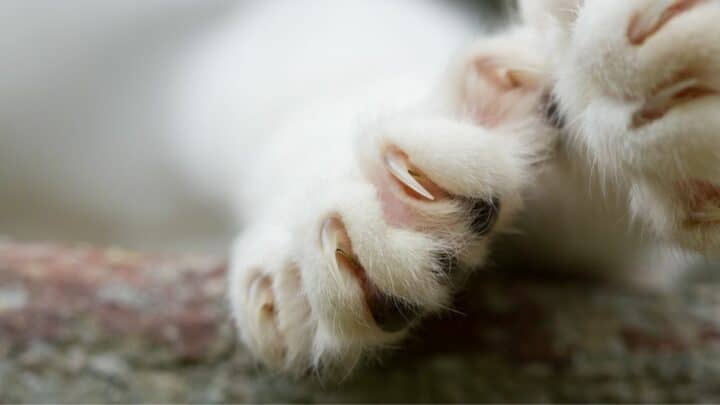Cat owners adore their pets but remain mystified by certain odd cat behaviors.
While nail-biting is usually a sign of nervousness in humans, cats may bite their nails for several reasons.
Yes, cats can indeed experience anxiety, but their nail-biting may not necessarily signify that they are afraid.
Although this behavior is harmless, it can pique the curiosity of cat owners. So, let’s explore the reasoning behind cat nail-biting.
Why Do Cats Bite Their Nails
Most likely, nail-biting is simply a part of your cat’s grooming routine. However, even though nail-biting is considered to be normal cat behavior, it can be a sign of anxiety or underlying medical conditions. Cats also have a tendency to bite their nails as a way of sharpening their talons.
Cats Often Bite Their Nails as Part of Their Grooming Habits
Understandably, cats prefer to have clean, well-manicured nails.
However, since cats can’t book an appointment with the local nail salon, they care for their nails as best they can by chewing them.
It’s known that cats are clean animals who are meticulous when it comes to their appearance, so it shouldn’t be surprising that nail care is part of a cat’s hygiene routine.
Just as humans clip and scrub their nails as part of personal hygiene, cats bite their nails for the same reason.
Dirt can accumulate underneath a cat’s nails, and biting behavior is often a way of removing the unwanted debris.
Cats may bite their nails after using the litter box or roaming outdoors in order to cleanse their nails.
Cats May Bite Their Nails When They Experience Stress or Anxiety
Yes, cats can become anxious and experience emotional distress. Cats may groom themselves extensively in response to feelings such as boredom, stress, and loneliness.
Although this is a normal and often temporary behavioral response, if it is prolonged, you may need to schedule a veterinary visit or make changes to your cat’s environment and routine.
In extreme cases, cats may groom themselves to the extent of hair loss and may begin to chew on non-food items as a means of coping with high levels of anxiety and stress.
If nail-biting seems to be a regular habit for your cat, minor alterations in the home environment may be sufficient to ease your cat’s anxiety.
It’s often helpful to provide your cat with a space in your home that is quiet, safe, and comfortable.
Providing additional stimulation such as a scratching post or toys may be effective at resolving any issue with boredom.
If you have multiple cats, offering individual food bowls for each cat can reduce the stress derived from competition over shared food resources.
Surprisingly, routines can also be a beneficial means of alleviating stress for cats. This can be accomplished simply by setting scheduled mealtimes and playtimes.
Cats Will Bite Their Nails as A Way of Sharpening Them
Cat nails have a layered structure, and the nail-biting behavior is often simply a way for cats to remove the outer layers of their nails and sharpen the remaining layers underneath.
This behavior’s commonly done with other behaviors such as scratching your new sofa.
Although many experts advise against de-clawing your cat, scratching posts are usually an effective deterrent from nail-biting and furniture destruction.
There is also a recommended method for trimming your cat’s nails at home to reduce the instances of nail-sharpening behaviors.
Many pet groomers offer nail trimming services as well.
Cats May Bite Their Nails in Response to Certain Medical Conditions
Clearly, nail-biting is a normal cat behavior that shouldn’t raise concerns unless the grooming becomes excessive.
Even then, minor changes in the environment can place your cat more at ease.
However, in rare cases, nail-biting can mean an underlying medical condition.
A disease known as Pemphigus can cause irritation and the development of lesions on your cat’s skin.
The paw area can eventually become encrusted, leading your cat to excessively grooming its nails.
Ringworm is a common fungal infection that your cat may self-treat through grooming.
However, when your cat’s attempt at healing is unsuccessful, serious infections may develop. Allergies and brittle nails in older cats may also cause excessive nail grooming.
Frequently Asked Questions About Why Cats Bite Their Nails
Is It Bad For Cats to Bite Their Nails?
In most cases, it is perfectly normal cat behavior that doesn’t require any action on your part. However, if your cat is also displaying symptoms of a medical condition or begins to groom themselves extensively, then you may want to address any triggers for anxiety or schedule an appointment with a veterinarian.
Why Does My Cat Keep Biting Their Nails?
Most likely, they are simply grooming themselves or sharpening their nails. In most instances, cat nail-biting is completely normal and doesn’t require any specialized treatment.
Should You Cut Cat Nails?
While experts advise against surgical de-clawing, it’s important for cat owners to periodically trim their cat’s nails, which not only reduces nail-biting and scratching but is also beneficial to the overall health of your cat.
Conclusion
So, if you notice your cat biting their nails, there’s no need to be baffled or concerned.
Chances are that they are simply sharpening their nails or caring for their hygiene.
However, if your cat is paying a little too much attention to its nails, you may want to take steps to alleviate stressors in the home environment or schedule a veterinary appointment.
Most likely, though, your cat is simply giving themselves a home manicure.


